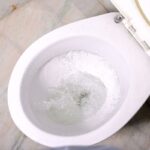When washing dishes, you might realize you have run out of the dish soap needed to finish the job. Fortunately, many substitutions work just as well to make your dishes as clean as possible.
If you end up running out of your regular dish soap, you can use baking soda, hand soap, lemon juice, and shampoo as alternatives. You can also try making your own hand soap with a multitude of items found in your kitchen.
Dishwashing shouldn’t stop just because you’re out of your usual soap. In this article, I’ll go over all the different items you can swap for your regular soap and how to use them effectively.

What Can I Use if I Run Out of Dish Soap?
Baking Soda
Baking soda is an excellent material for cleaning and works as a dish soap replacement. It is made of soda bicarbonate which is more abrasive than the materials found in different types of soap. Baking soda can be used for hand washing dishes, not in a dishwasher.
Baking soda will not lather like dish soap and instead forms a paste. However, baking soda will still easily remove stains, grease, and old food from your dishes. If you want to add in some extra sanitation to make sure you got all the grime off, you can
Even though it is harsher than soap, it will not harm the surface of your dishes through the cleaning process.
To use baking soda as a dish soap substitute:
- Pour the baking soda into a bowl of water or by sprinkling it directly onto the dishes.
- Use a sponge or cloth to scrub your dishes clean.
- After scrubbing, rinse to make sure all baking soda clumps are removed.
Hand Soap
Hand soap is a substitute that is almost identical to dish soap. Both contain the necessary ingredients to lift and remove built-up materials from dishes through a lather. The difference between the two types of soap is that hand soap is not as harsh as dish soap as it primarily cleans skin, not dishes.
Hand soaps contain more fats and oils intended to provide more moisture. Because of this, hand soap is softer and more gentle in comparison to dish soap. Hand soap can be used in the same way that dish soap would.
Bleach
Bleach, a cleaning product used to disinfect and kill bacteria, can be used to wash dishes. However, you should be careful when using it because bleach comes with many limitations.
You must dilute bleach with water before using it to clean any surface. The CDC recommends that five tablespoons of bleach per gallon of water or four teaspoons per quart of water must be used. Additionally, the instructions on the bleach bottle should be referenced when creating a solution.
Also, you cannot mix bleach with other soap, cleaners, or disinfectants because mixing can cause a toxic chemical reaction or the release of ammonia gas. Only mix bleach with water in a separate container before dishwashing.
Any dishes, utensils, or cookware made of metal or wood should not be washed with bleach as it causes damage to the surfaces. Additionally, bleach should be used sparingly and not as an everyday wash.
Lemon Juice
Lemon juice is an unlikely substitute for dish soap, yet its acidity levels help remove and break down residue left behind on dishes. Lemon juice can be added with other dish soap alternatives (except bleach) or used independently.
To use lemon juice to clean your dishes:
- Squeeze out the juice from one lemon and mix it with a cup of water.
- Use a sponge to use the lemon juice mixture on the dirty dishes.
- After rubbing the lemon juice on the dishes, run them under warm water.
What Products Should Not Be Used if I Run Out of Dish Soap?
While many products can be used in place of dish soap because they contain some of the same ingredients, some products will fail to remove stains and food from the dishes, and others will cause more harm than good.
Laundry Detergent
Laundry detergent is perfect for washing clothes, though it is not a good substitute for dish soap. It has a similar texture to dish soap, yet it can lead to more damage to your dishes over time.
Laundry detergent contains different chemical ingredients than dish soap. Like many other products, laundry detergent is made of chemicals and ingredients explicitly intended for washing fabric. Softeners, brighteners, and other altering components are all only present in laundry detergent, not dish soap.
Hand Sanitizer
Hand sanitizer is also a product that is not a suitable replacement for lack of dish soap. Their intended purpose is to disinfect germs on the skin, and most hand sanitizers are alcohol-based. Because of this, their makeup is significantly different from dish soap’s, even if they look similar.
Sanitizers also lack the components necessary for a good lather. Without that lather, the mess left on your dishes can be broken down and will take longer to scrub off manually. In addition, the sanitizer will leave slimy remnants behind that can be challenging to wash off with water.
Conditioner
You cannot use conditioner as dish soap because it is too thick and does not lather. Conditioner is much creamier in texture than dish soap, and this inability to foam up will make scrubbing your dishes messier.
If you want to learn about other uses for conditioner, check out my article on whether or not conditioner can be used as body wash.
Is Dish Soap Necessary?
Dish soap is not necessary to clean your dishes. It is an excellent addition to help remove much of the buildup, grease, and stains, but other cleaning alternatives can be used instead.
Dish soap creates suds that breakthrough and lift dirt, food, and grease off the surface. As long as you have some kind of product that can break through leftover messes and disinfect the surface area of your dishes, you can be assured that they are spotless.
Can I Use Shampoo as Dish Soap?
You can use shampoo as dish soap despite it being a hair product. Shampoo works very well as a dish soap substitute if you are handwashing items and not using a dishwasher.
Like hand soap, shampoo is gentler than dish soap and may require more manual scrubbing to break apart the residue left over on the dishes.
Can I Wash Dishes With Just Water?
You can wash dishes with just water if no other soaps are around. It may be harder to scrub dishes with leftover items stuck to them, but it will be possible.
If you want to wash your dishes in just water, ensure it is hot to disinfect all the bacteria. Hot water can also create a soak to soften up all the food or grease remnants off the dishes. This act will make it easier to scrub and rinse them away.
How Do You Make Your Own Dish Soap?
You can make your own dish soap at home with bar soap, water, baking soda, and lemon juice. Combining these ingredients will give you a healthy supply of dish soap made from items you likely have stocked at home.
To make your dish soap, you will need to:
- Grate your soap using a cheese grater.
- Add the grated soap or a bottle of hand soap to a gallon of warm water and stir.
- Add a little baking soda or lemon juice for extra disinfecting abilities and for a clean scent.
- Let your product sit for a few hours before use.
After these steps, you will have your version of dish soap almost identical to traditional brands.
Final Thoughts
If you find yourself out of or low on dish soap, you can use various other household cleaning products, such as hand soap or shampoo, as replacements. These might differ slightly from ordinary dish soap, but they will still leave you with spotless, clean, and sanitized dishes.





